24-25 September, London — Big Data London consistently brings together the biggest names in data leadership and vendors.
Buzzword bingo was in full swing (AI-first, digital twin, self-service, scalable governance). But woven through the hype were some far more grounded topics: trust, skills, strategy, and what’s still missing. If you listened between the lines, what emerged was a picture of a data and AI landscape that’s maturing fast, but still tripping over some very human problems.
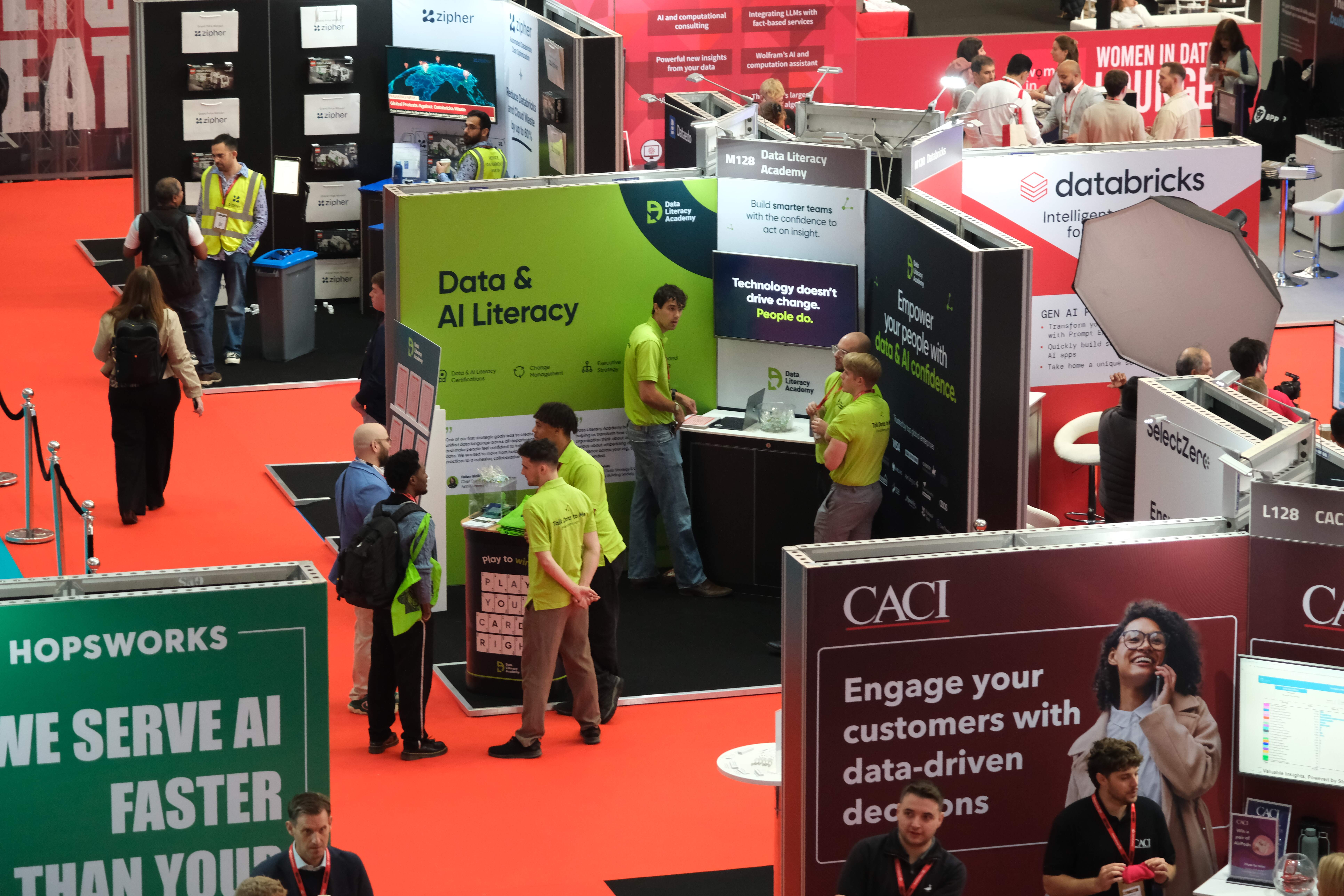
Ministry of Defence and Multiverse: Building Data Skills to Drive Strategic Defence Reform
In this conversation, we got to hear Jane Crowe, Deputy Head of Data Skills & Culture of the Ministry of Defence discuss their apprenticeship programme with Multiverse. MOD is not your average organisation. They're highly structured and are mission-critical in ways most businesses will never have to worry about.
That's why it's a big step that they've reached a new level of maturity where 250 people got enrolled on to their new apprenticeship programme. Jane’s team cast a wide net with the initial offer, asking “who wants in?” sent across their workforce and 1,100 people registered interest. Demand is clearly there.
They’ve since developed three personas to structure their approach:
• “Explorers” — foundational needs, often not in data roles.• “Advancers” — the big middle, trying to level up.• “Professionals” — future analysts, engineers, and leaders.
It’s simple and scalable and gives the team the language to talk about skills and progression in a way that works across Navy, Army, and head office. They’re already seeing early signs of real change. Uniform procurement has been streamlined thanks to better data use, with knock-on cost savings.
Operational teams are now using bespoke tools to support secure collaboration.But perhaps the most quietly radical thing Jane said? “We’re not talking about data as a separate thing anymore. It’s skills-first, regardless of role.”
Cynozure: AI can do what you do - rethinking how we lead, contribute and create value in an AI-powered world
Jason Foster, CEO at Cynozure, delivered the kind of keynote that makes you sit up. Less “transformation roadmap,” more historical case study with a punch.He walked through how major technologies, from shipping containers to electric looms, didn’t just improve things; they rewrote the script on a new normal. While they made whole industries obsolete, they also gave rise to entirely new ones.
Every new wave of tech, Jason argued, moves humans from “doing” to “designing.”The risk now? Too many enterprises are still stuck on the factory floor, clinging to repetitive manual tasks, trying to automate what they don’t fully understand.
AI is the shipping container moment. But you don’t just need better tools. You need people who know what to do with them, who can connect dots, steer strategy, and create clarity when everyone else is overwhelmed by options.
As Jason put it, “AI can help you be right. But it can’t help you be trusted.”
Humanising data strategy
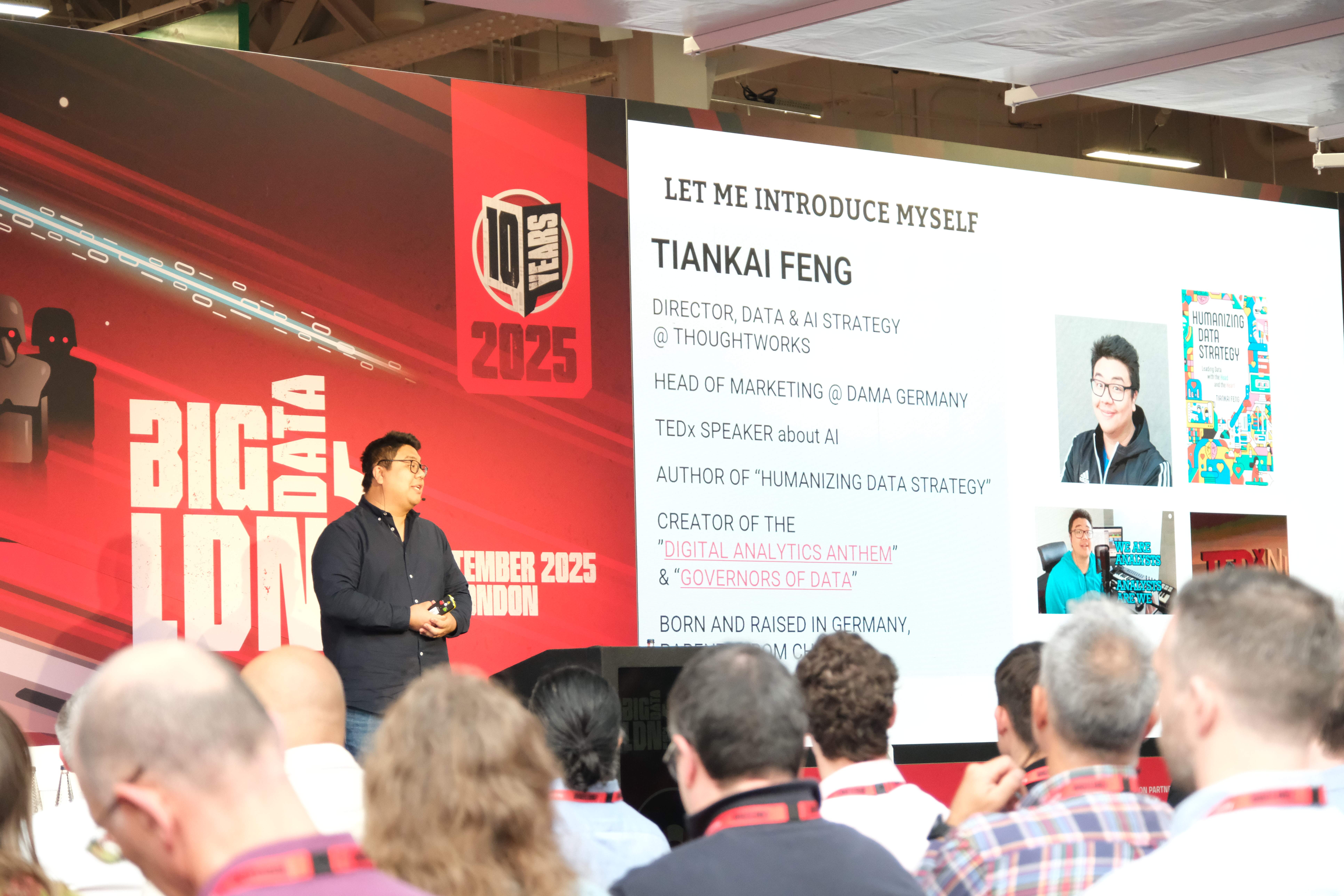
There’s a lot of energy going into top-level AI strategy. There’s also plenty of action happening at the edges: teams experimenting, analysts upskilling themselves, apprenticeships delivering value.But the middle? That big, unwieldy, operational middle?It’s still under-served.
That’s what Tiankai Feng, Director for Data & AI Strategy at Thoughtworks hinted at: data teams can’t keep blaming “the business” for not adopting tools, when they haven’t bothered to bridge the business acumen gap themselves. His call was clear: stop being transactional. Stop measuring success by service tickets closed. Start co-creating. Start listening. Start asking what actually matters to the teams you're trying to support.
Human AI: Innovation with data, passion & purpose, within Financial Services
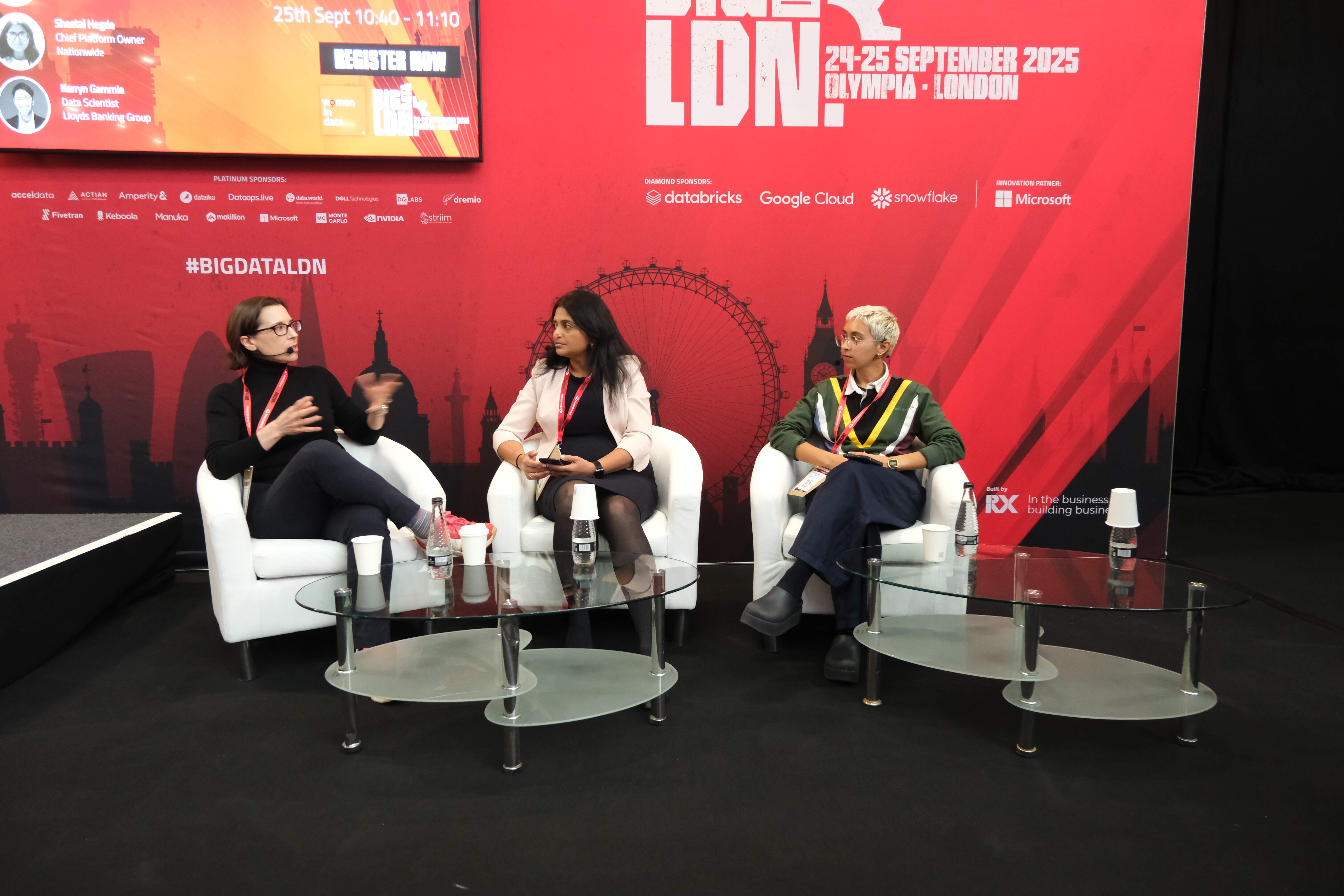
This Women in Data® panel made one thing crystal clear: responsible AI doesn’t start with code, it starts with people.
Sheetal Hegde, Chief Platform Owner at Nationwide, set the tone: “Explainability drives trust. Usability drives impact.” Her point? Technical brilliance means nothing if business users don’t understand the problem being solved or aren’t involved in the process from the start. She urged teams to move beyond “one-and-done” training and build feedback loops into every proof of concept. “Co-creation is key,” she said. “You can’t let it be fully tech-driven. Business users need to be in the room from day one, not just for sign-off at the end.”
Dr. Dara Sosulski, Managing Director and Head of AI at HSBC, pushed the conversation into practical territory. She outlined a three-tiered approach to AI education: “Everyone needs AI 101. Everyone needs Responsible AI. And every solution needs bespoke training, it’s the linchpin that holds it all together.” She challenged the myth of complexity as a virtue: “Use the simplest model that does the job. It’ll be the most explainable and the least likely to fail.” On regulation, she pointed to the EU AI Act as a wake-up call: “We’re beyond the era of a single centre of excellence. AI responsibility is now distributed and everyone needs to know what rigour looks like.”
Kerryn Gammie, data scientist at Lloyds Banking Group, delivered one of the most grounded insights of the session: “Start with values. Go slow. Build from first principles.” She shared how consequence scanning workshops are helping Lloyds embed ethical guardrails into AI products, not just at launch, but throughout their lifecycle. “You need to ask: what happens when this breaks? And who’s accountable?” Her take on scaling AI responsibly was pragmatic: “If we’re looking at AI for accountants, you need to ensure that someone who understands accounting standards is still in the loop when AI summarises a complex financial regulation.”
All three leaders agreed: Human-in-the-loop remains a key strategy. And it has to be embedded early. Whether you're automating a trading model or flagging suspicious transactions, the critical question isn’t just can you automate, it’s where does the human belong in the loop?
The ROI Gap: Why Data and AI Investments haven’t paid off
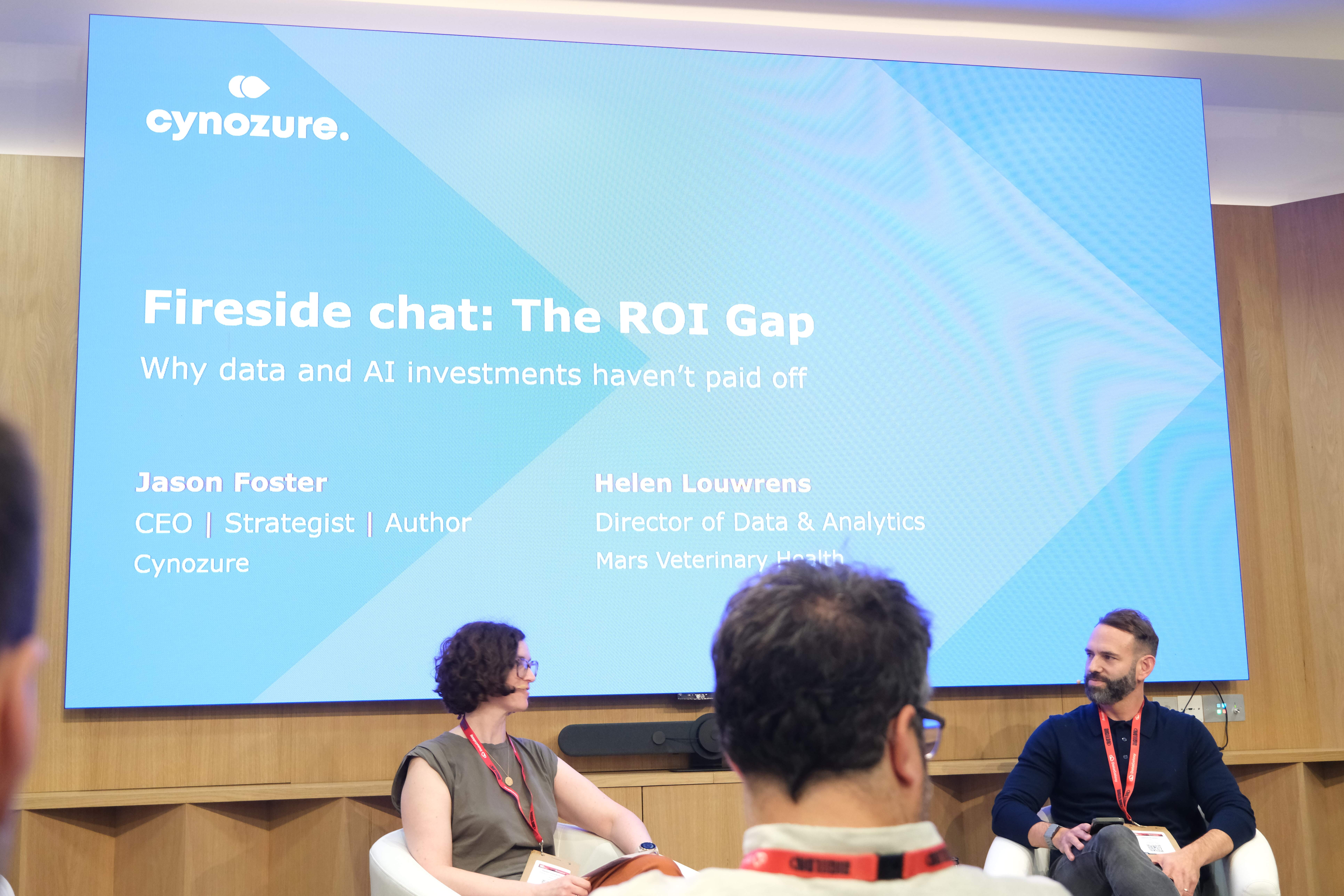
Data teams have been promised the world, but when it comes to ROI, too many are left holding the bag. In this candid fireside chat, Jason Foster (Cynozure) and Helen Louwrens (Mars Veterinary Health) unpacked why data and AI investments often miss the mark and why it’s not just a measurement problem, but a mindset one.
“There’s often value being delivered,” said Helen, “we’re just not telling the story well enough.” That story gets murkier when big-ticket infrastructure eats up budgets while quick wins go unnoticed. Jason pointed to Tesco’s “Have you forgotten...” checkout prompt as a perfect example of earning the right to go bigger: a scrappy, self-contained feature that drove ROI overnight.
Contrast that with years-long legacy overhauls, necessary, but hard to defend without proof of early value. The panel called for tighter partnerships with finance, honest conversations about who owns the benefits, and clearer ways to capture impact.
“The data team rarely gets credit for the wins,” Jason noted, “but they’re often the enablers behind the scenes.” If that stays invisible, disinvestment follows.
The fix? “Create a feedback loop. Build champions. Be relentless in surfacing outcomes, even the intangible ones,” Helen urged. From misaligned ownership to land-grabby politics, the ROI gap won’t close itself. But with strategic allies and a better story, the case for data investment starts to write itself.
DinMo & Data Literacy Academy: From monoliths to modules: Why composability wins in data
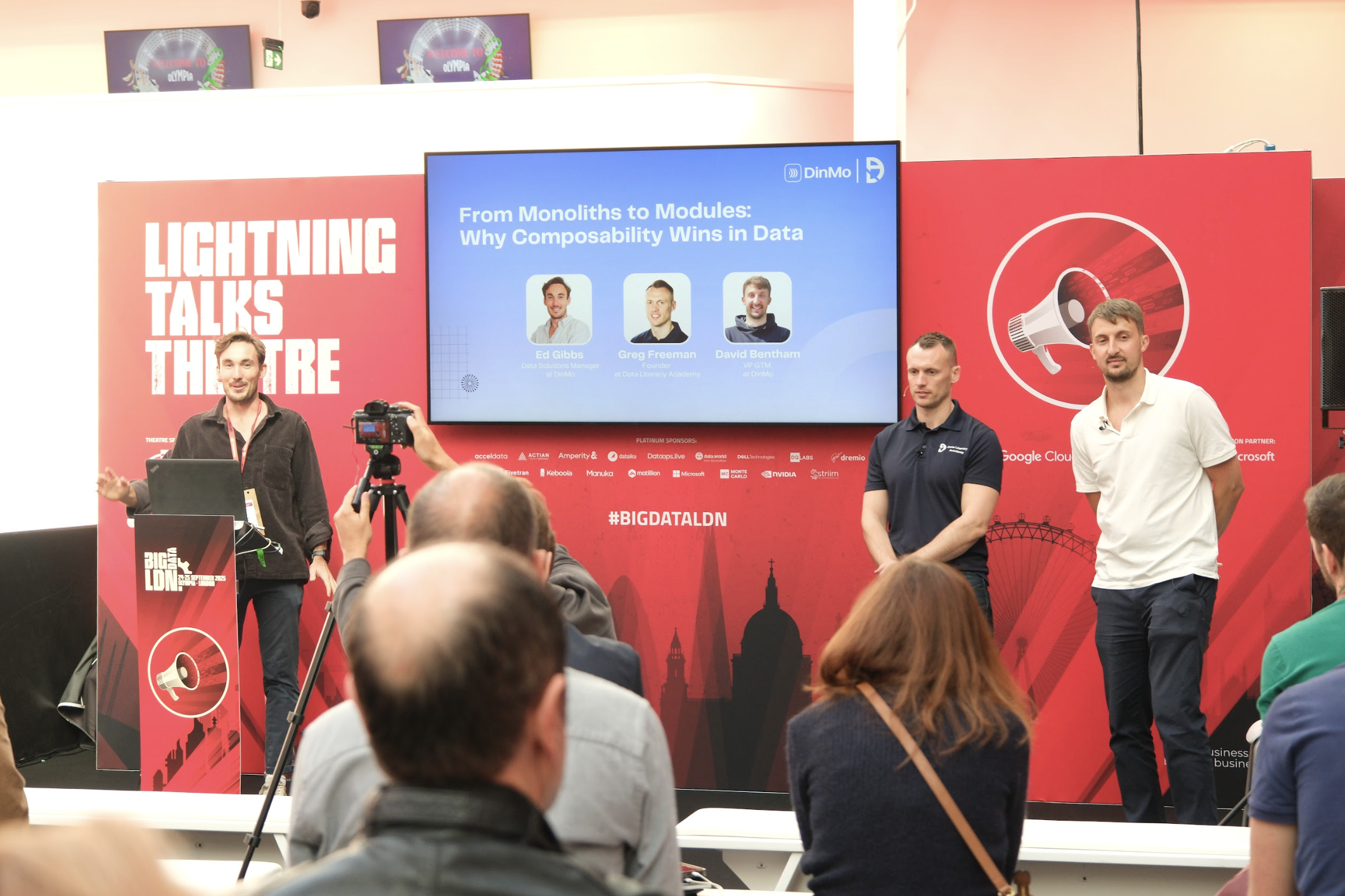
For this talk, David Bentham, VP GTM at DinMo was joined by Greg Freeman, CEO & Founder of Data Literacy Academy.
Greg starts off by sharing: “If you don’t communicate it well to the business, and they don’t know what you do for a living, your projects aren’t going to be as successful as you want them to be.”
Whether it’s a monolithic legacy stack or the mindset that built it, the biggest barriers to data impact are rarely technical. “One part of the business is locked in this legacy monolith. The other was built for composability. They can move fast, solve problems quickly, and they’re attracting the kind of engineers who don’t want to work on tech that’s 10 or 15 years out of date.”
And as we hear so often, it bears repeating: don’t lead with the tech. “Rule number one: don’t use the word composability. Your C-suite doesn’t care about architecture diagrams. What they do care about is vendor lock-in, flexibility, and how quickly you can deliver on this year’s business priorities.”
He pointed to Blue Cross Blue Shield as a standout example: “They made customer experience the strategic priority. That gave the CDAO a mandate to modernise the tech stack, not across the whole business, but within the customer function where it mattered most. That’s how you win hearts and minds.”
The same logic applies to proving value. Don’t wait for a 12-month roadmap or a full platform rollout. “There’s never a right time. But if you don’t just get started, you’ll be in the same place in 12 months or worse.”
And finally, a challenge to every data professional in the room: “There aren’t enough people in this room who understand business in its true form. Just like at a business conference, there aren’t enough people who understand data. You can’t keep throwing crap over the fence and expecting it to stick. You’ve got to be seen as a partner.”
The real lesson? It’s still a people problem.
Data and AI still aren’t magic. They’re multipliers.And like any multiplier, what they amplify depends on what you feed them, fear or confidence, isolation or collaboration, confusion or clarity. Big Data LDN didn’t offer all the answers. But it did show us one thing very clearly: You can lead a horse to a dashboard. But if they don’t trust the data, understand the tools, or believe in the process, they’re never going to use it. And that’s why, while AI keeps taking up attention, it’s still as critical as ever to invest in your culture and people to make them ready to keep driving efficiency, innovation and solving those key business problems.
Unlock the power of your data & AI
Speak with us to learn how you can embed org-wide data & AI literacy today.





.png)
.png)
.png)
.png)
.png)
.png)
.png)
.png)

.png)
.png)
.png)

.png)
.png)
